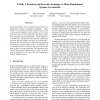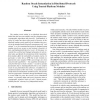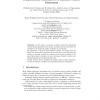1401 search results - page 47 / 281 » Randomness in Interactive Proofs |
NDSS
2009
IEEE
15 years 4 months ago
2009
IEEE
We describe CSAR, a novel technique for generating cryptographically strong, accountable randomness. Using CSAR, we can generate a pseudo-random sequence and a proof that the elem...
AINA
2007
IEEE
15 years 4 months ago
2007
IEEE
The random oracle model is an idealized theoretical model that has been successfully used for designing many cryptographic algorithms and protocols. Unfortunately, a series of res...
ACMDIS
2006
ACM
15 years 1 months ago
2006
ACM
Randomness is being harnessed in the design of some interactive systems. This is observed in random blogs, random web searching, and in particular Apple's iPod Shuffle. Yet t...
ISAAC
2004
Springer
15 years 3 months ago
2004
Springer
We propose a model of computation where a Turing machine is given random access to an advice string. With random access, an advice string of exponential length becomes meaningful ...
SACRYPT
1998
Springer
15 years 1 months ago
1998
Springer
In this paper, we present a simple method for generating random-based signatures when random number generators are either unavailable or of suspected quality (malicious or accident...



